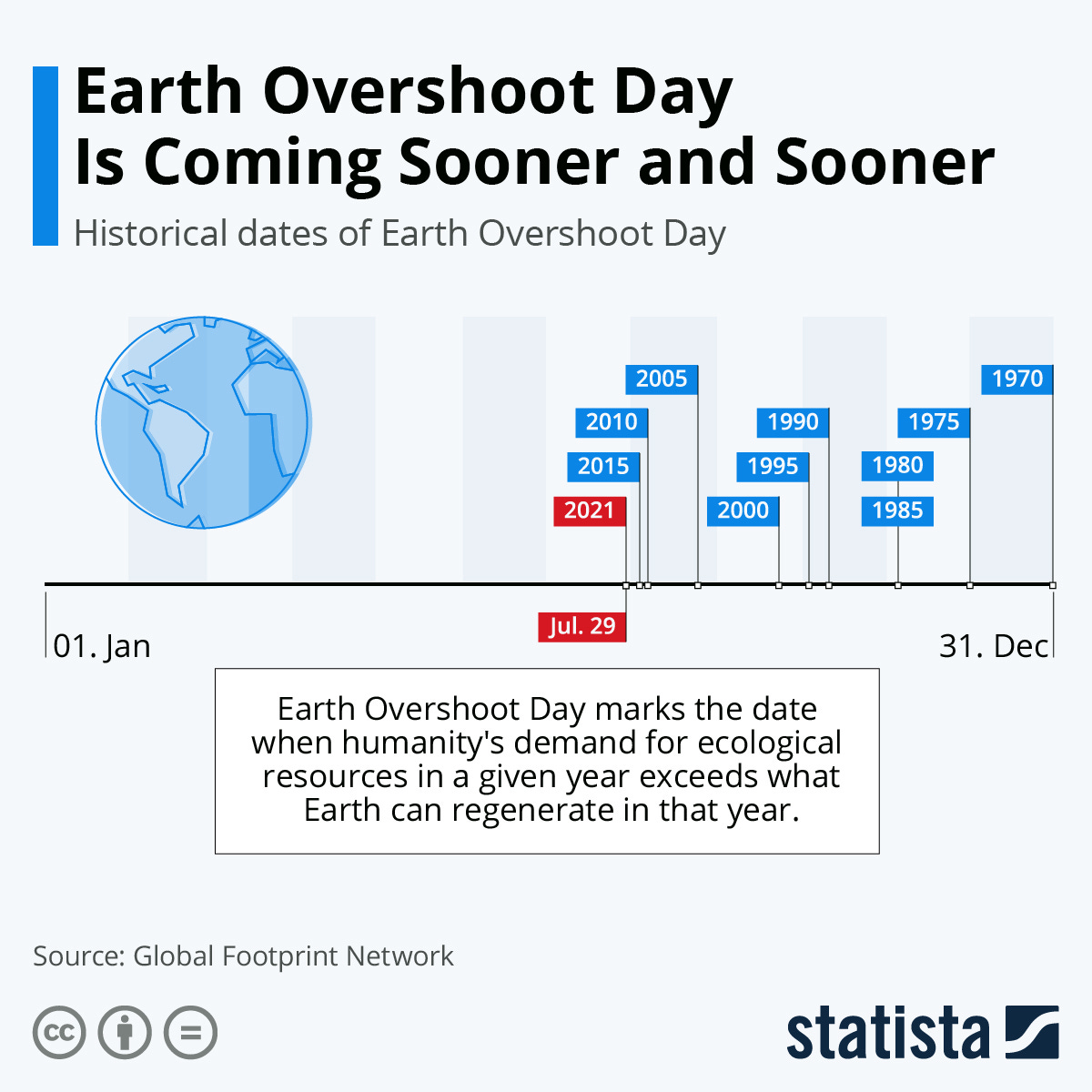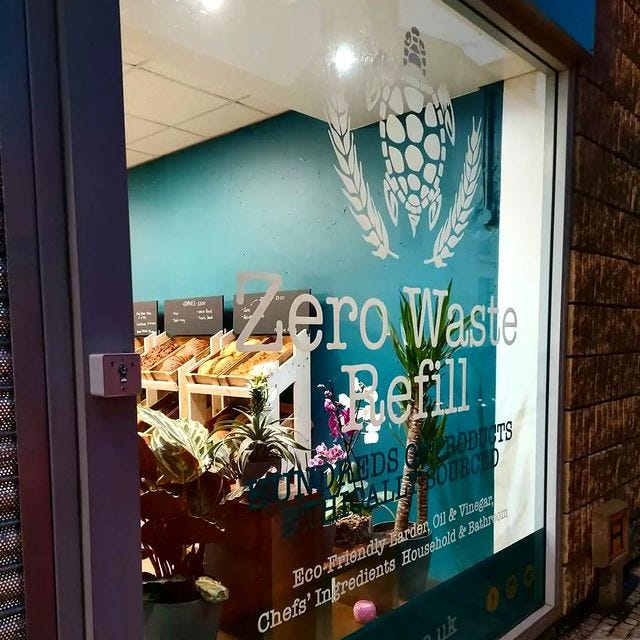OK but isn't buying 'stuff' inherently bad for the planet?
The Green Fix on what a sustainable business actually means.
Are you good or bad?
You have to choose. You have to be one. Be good like me. Be zero-waste and anti-consumerist and plastic-free. Shop only local but make sure to buy nothing at all. Be vegan but wait - do you know how bad avocadoes are?
For a climate movement united by care for one planet, we’re living on different ones. Digital bubbles, media algorithms and efforts to simplify things that are not simple suck us into a world of binaries. Things are sustainable or they’re not. You’re doing it Our Way or you’re wrong.
I am part of this.
Talk to me for 2 minutes and you see I’m comfortable on my anti-consumerist high horse. Buy second-hand, I say to anyone who’ll listen. Consumption is the plague of the modern-day, I tell my hostage audience of choice.
There’s false safety in binaries. We build comfort zones in the idea that if we’re doing our best then we’re good, and corporations and politicians are the big bad monsters under our bed, the future-snatchers.
It makes me feel awkward to do an edition on sustainable business. Because it doesn’t fit in my binary world. I talk about business in the same way that people tell ghost stories around a campfire. With a far-away, haunted look.
But as small businesses tumbled into my Twitter DMs to explain how they invest their profits in social and environmental causes, I was confronted with the disturbing possibility I could be wrong.

And why shouldn’t I be wrong? Isn’t the idea that there is one right way to navigate the climate crisis another false binary?
The Green Fix is not here to prop up ‘business as usual’ or to give you the answers. But we are not at the start of the path to a green future. We are beginning from the centre of a labyrinth. Embedded in a web of political, economic and social systems, and looking for an easy way out.
Some things are simple. We avoid 2 degrees of warming or we don’t. We prevent islands sinking into the sea or we don’t. But the path to get to any of those scenarios?
Will most likely not be good or bad or simple, but a collection of all those things at once. Just like your 2013 Facebook relationship status, it’s complicated.
***
I run The Green Fix for free because climate action should be accessible to everyone. If you find this newsletter helpful, consider paying a virtual tip to help support it!
You can also do me a huge favour by sharing it using the button here:
What’s Going On?
Half of global coal companies continue to develop new coal plants.
Related: Global tracking report of the transition away from coal.Shell pulls out of plans for new UK oil field Cambo.
Useful: Take 2 minutes to join the online campaign to #StopCambo.Oil companies are teaming up with PR firms to delay climate action, new research finds.
Related: The original research paper.Your high street fashion brand is fuelling deforestation in the Amazon.
Useful: An app to tell you which fashion brands are better for the planet.COP26 pledges are too late for families living with the impacts of the climate crisis in rural Kenya.
Related: Listen to Kenyan farmer Lomilio Ewoi Erot share his story.EU’s new farming policy falls far short of climate targets.
Useful: What exactly is the big deal with the new CAP policy?
Focus On… Sustainable Business
The Green Fix volunteer Rachael Goodfellow talks to Hannah Cox, co-founder of a network for businesses that want to do better for the planet.
What is the Better Business Network?
I’m Hannah Cox, co-founder of the Better Business Network (BBN) and sustainable impact agency owner.
I was sick of being the only one at business networking events that was not only thinking about profit but about the planet and my business’ use and value. We started the BBN in 2021 because we realised governments were not making the change, too focused on remaining in power and the 5-year timeline.
Businesses are capable of making change, especially by working together to push collective action. The BBN network allows businesses to connect on their values and offers support to purpose-driven entrepreneurs - it’s not just about profit, but what they can add.
The BBN is self-funded and our first membership round had 30 businesses. By 2022, we aim to have tens of thousands of members, divided into cohorts.
What value does the network have to the planet?
Firstly, purpose-driven businesses can only achieve impact if they have enough income! We help businesses with crafting sustainable policy and strategy, public communications, and becoming B-Corps.
Secondly, the network offers a tool for collective action. We are a Climate Positive Workforce with Ecologi. We also partner with 1% For The Planet and Client Earth, and take part in government advocacy campaigning. Every month, we give a percentage of the membership fees to an Impact Fund and each month we all choose one charity to give that money to.
What is your definition of 'sustainable business'?
The UN defines sustainability as "meeting the needs of the present without compromising the ability of future generations to meet their own needs." We know we are in a climate crisis, we know Earth Overshoot Day comes earlier each year, and businesses know we have a societal issue with overconsumption.
As a business, you have the responsibility to acknowledge your role in this and set social and environmental goals which create a positive impact as part of your business strategy.
OK, sounds cool - but is being an ‘ethical consumer’ even possible when consumerism is unsustainable?
[Related: ‘What is ethical consumerism?’]
A lot of ethical responsibility has been placed on consumers to make sure they’re sustainable and ethical when it should be on businesses and governments to make sure sustainability is accessible.
We do need a consumer behaviour change, but examples like the successful plastic bag tax in the UK shows how governments can prompt this change.
Businesses need to provide products that are cool, affordable and useful to individuals. The challenge is finding ways to provide sustainable products and create customer loyalty without pushing the price up to an unaffordable level.
One of the most important things consumers can do is change their banking. After that, we can’t do everything but we must all do something. Do whatever you can with the resources and time available.
Aren’t growth-driven models of business incompatible with sustainability?
Growth-driven businesses for a product or service we don't need or that has a negative impact on the environment is very different to a growth-driven company solving a food waste problem.
We need to get off the idea that being profitable means being destructive. For businesses to be sustainable, it's not just about being green, it's about being useful as well.
Business is built on the foundations of 'how will this make money for the shareholders of the business?’. I believe it should be built on the foundations of 'how will this make a positive impact on its stakeholders?'.
That's why I am aligned with the Better Business Act. Lack of systemic change is incompatible with sustainability. Lack of vision is incompatible with sustainability.
Note from the editor: I was curious to hear what other businesses thought on this question so I put a callout on Twitter. Here’s what they had to say:
Louise Humpington, zero-waste store Grain & Sustain:
Being sustainable in business means educating customers and empowering them so that they can make better, more environmentally friendly and ethical spending choices. It means working with like-minded businesses to normalise being good in business and not just good at business. It means leveraging our influence as small indie businesses to pressurise big business to become more sustainability focused.
But most importantly, it means recognising that whilst we all have a role to play, there is no one size fit all solution. We may all be in the same storm but we are not all in the same boat. We need to understand the impact of our choices on the poorest and most vulnerable communities.
Stephen Stegeman, CEO of Shop Like You Give a Damn:
I actually believe it's near impossible to be a sustainable business according to [the UN definition]. Producing stuff almost always requires resources that won't be replenished for tens of years.
Yet, not being a sustainable business is far worse than being one. Actually trying to do better is important. Doing is better than talking about it. Being a sustainable business is the only serious approach we have to sustain the world and its people’s needs. And I believe sustainable businesses are the only type of businesses that should exist.
So Now What Do I Do?
LEARN
Tune into this free webinar by Nesta on the links between climate change and structural racism. 9th December @ 1pm CET.
As the festive season nears, here’s a guide on how to host a sustainable & intentional gathering.
Check out last year’s Green Fix for our guide to a sustainable Christmas.
TRY SOMETHING NEW
Sign up to Traidcraft Exchange’s Injustice Advent Calendar for 24 free actions to stand up for justice.
Join the 16 Days of Activism campaign to end violence against women. The 16 days are drawing to an end but luckily you can campaign for women’s rights literally anytime.
EU youth: Share the ideas you want represented at the Conference for the future of Europe.
CHANGE THE SYSTEM
Aged between 16-22 and involved in youth organising? Apply to join the FCYO Youth Bureau! Deadline 17 December (not what the form says).
Sign the petition to cut off fossil fuel company Total’s funding.
Apply to become a volunteer youth Project Officer for the UN Sustainable Development Network.
By the way…
Got a campaign, opportunity or upcoming event you want to shoutout here? Fill out this form & tell us what you’re up to!
Stay in the loop
You can connect with The Green Fix on Twitter and LinkedIn. You can also say hi to me (Cass) directly via my Instagram, Twitter and LinkedIn.










